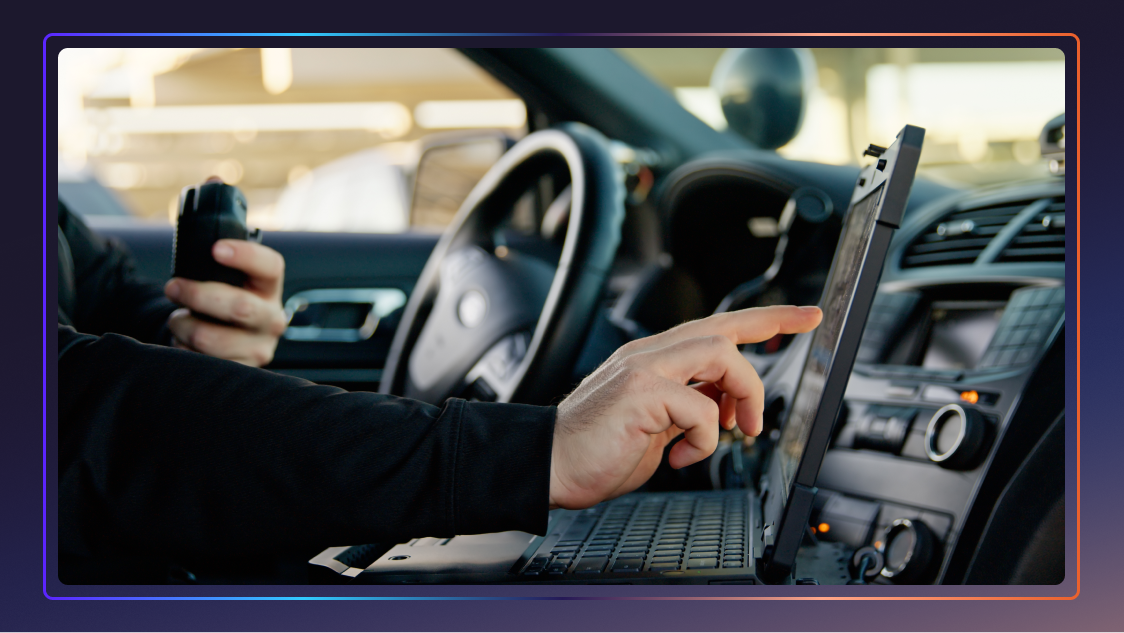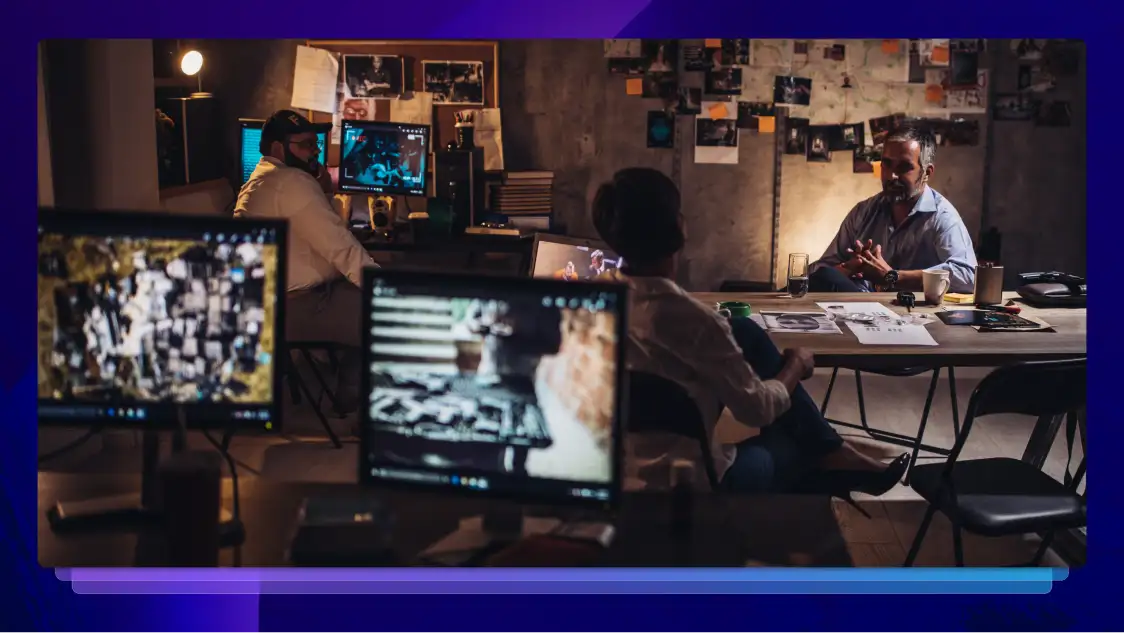11 Meeting AI Tools For Boosting Productivity
Discover 11 AI-powered meeting tools that transcribe discussions, summarize key points, and automate follow-ups to make meetings more productive.

There have been many studies done and statistics generated on what makes a meeting productive or necessary. And with some employees stating that it’s easy to start feeling the burn when attending too many back-to-back meetings, you better make sure that if you do schedule one, it’s going to be important enough to keep your employees or coworkers engaged.
AI for meetings can help make meetings more inclusive, engaging, and help you keep track of meeting notes once they’re finished. Let’s look at some of the best AI meeting assistants and note-taking tools that can help you make your workday less stressful and more productive.

1. Rev
We call Rev “your productivity BFF” for a reason. Rev integrates with your meeting host (Zoom, Teams, Google, you name it), and can transcribe the meeting, send notes, and even provide an AI-generated summary to help you remember the most important parts.
In addition to helpful features like AI blocks and templates that you can use over and over again to add structure to your transcriptions, Rev is also just more accurate than any other product on the market. Our transcriptions were proven time and time again to be more accurate than our competitors.
- Notable features: The AI assistant will generate insights and social media posts from the transcript of your meeting.
- Cost: Limited free tier with additional options for a cost.

2. Otter
Otter is a great AI for meeting minutes (though, not to brag, Rev is proven to be better than Otter). It provides automated meeting summaries with action items for your entire team. After the meeting is done, Otter will share a summary of what was discussed with all attendees, so you don’t have to worry about anything slipping through the cracks.
- Notable features: You can connect Otter.ai to your calendar to enable it automatically for your meetings.
- Cost: Tiers starting at $8.33 per user, per month.

3. Fireflies
Fireflies helps you keep your meetings organized by providing transcripts, notes, and to-dos after each meeting ends. You can invite the Fireflies AI note-taking tool to your meeting, then it will provide the transcript when it’s finished. Along with the AI-powered notetaker, Fireflies can also capture video and audio from the meetings.
- Notable features: The Fireflies AI can generate insights about your meetings.
- Cost: Limited free tier with additional options for a cost.

4. Equal Time
Ever felt like it’s hard to get a word in during a virtual meeting? That’s what Equal time is trying to eliminate. When you integrate Equal Time with your meetings, it keeps track of how long each individual attendee spoke and when certain conversations fizzled out. You can use this to make sure quieter members of your team are being heard (which can be helpful for DEI initiatives), and discover how to make your meetings run smoother overall.
- Notable features: Equal Time provides an inclusion score at the end of each meeting, which tells you how well the time was split between attendees in the meeting.
- Cost: $15 per month, with no free option.

5. tl;dv
Those who have been on the internet may have seen the acronym “tl;dr,” which stands for “too long, didn’t read.” People use this acronym when they think an article or blog is too long so they don’t read the whole thing. The founders at “tl;dv” know the same concept may apply to video meetings, and because of that, they created software that records and transcribes the meeting and then provides a detailed summary.
- Notable features: tl;dv can provide meeting scorecards that show your team how they can make meetings better and more efficient.
- Cost: Limited free tier with additional options for a cost.

6. Avoma
Avoma aims to provide a comprehensive solution for meeting management powered by artificial intelligence that tackles multiple parts of meetings. The AI features provide recordings and summaries of the most important parts of your meetings and then turns the transcripts into a searchable knowledge base for future reference.
- Notable features: In addition to providing an important part of a meeting, Avoma will also identify who the speaker was.
- Cost: Limited free tier with additional options for a cost.

7. Rewatch
Let’s face it: people aren’t going to be able to pay attention to your video meeting the whole time. Rewatch recognizes this, and allows you to record your meetings and keep them all on a searchable knowledge hub for later. It also provides transcriptions of your meetings in which team members can then collaborate on to add notes, comments, and celebrations.
- Notable features: The hub feature allows you to categorize videos by topic and lets your team search for what they want.
- Cost: Limited free tier with additional options for a cost.

8. Fellow
Fellow is a meeting integration and productivity tool that turns your meetings into a summarized list of important points and actions that can be taken next. It also immediately transcribes your meetings into 10 languages, and provides an editable transcript in case someone from your team wants to add more information.
- Notable features: Fellow will flag when people invited to a meeting have had a surplus of meetings that week, so you can determine if they really need to attend.
- Cost: Limited free tier with additional options for a cost.

9. Granola
Granola is an “AI notepad,” which means it takes notes that you’ve written manually and cleans them up using artificial intelligence and transcribing your meeting. If you write shorthand or unorganized notes during a meeting, the Granola app will enhance and organize them into something more comprehensive and usable. Sounds perfect for busy project managers or C-suite members, right?
- Notable features: Granola doesn’t have a bot join your call — it uses the audio directly from your computer to get the transcriptions it uses to uplevel your meeting notes.
- Cost: 25 free meetings, then $10 per user per month.

10. Nyota
Nyota provides a comprehensive view of your meetings from the moment you log in. It transcribes meetings, takes notes, summarizes key insights, and groups together the topics covered in each meeting. Once a meeting is over, it also takes the topics covered and uses AI to create an agenda for the next one.
- Notable features: At the beginning of the day, Nyota sends you an email with the meetings on your plate for the day and their agendas.
- Cost: Tiered pricing starting at $12 per month.

11. Krisp
Krisp shines in workplaces that might be a little more bustling. Its AI-powered noise cancellation feature removes the background noise and echoes from your meetings, so you can play them back without getting distracted. It also provides meeting notes and summaries.
- Notable features: The AI accent localization feature converts meeting participants’ accents to match the customer’s native accent.
- Cost: Limited free tier with additional options for a cost.
How AI Helps Boost Productivity
Artificial intelligence has been proven to help save time, effort, and money. It can streamline tasks, generate ideas, and help organize your notes so you can focus on your tasks and not on some of the tedious work like copy editing, transcribing, or organizing.
Some ways AI tools can help make you more productive include:
- Taking care of repetitive, tedious tasks like data entry
- Helping organize your electronic or manual notes and point out key topics you should focus on
- Attend meetings for you in your absence, summarizing key points so you can jump back in without missing a beat
- Taking a half-baked idea and helping flesh it out into something more useful
- Predicting market trends so you can stay ahead of the game
Check out our meeting productivity ebook to learn more.
What to Look For in a Helpful and Safe AI
Of course, like any technology, artificial intelligence is something that you should jump into without proper training and preparation. A safe AI system won’t abuse access to your personal data, or perform tasks it wasn't specifically asked to.
When looking to utilize AI at your company, you should prioritize systems that are:
- Transparent
- Have defined privacy settings
- Have a collection of good reviews (if applicable)
- Reliable
- Intuitive
Don’t Put Meeting AI Tools On Mute
Integrating AI meeting assistants into your meetings can greatly improve their quality, helpfulness, and efficiency. Tools like Rev — which was proven to be 60.5% more accurate than Google’s speech recognition in our ASR report! — help provide accurate transcriptions, point out key moments, and allow you to look back easily on what happened during a meeting.















